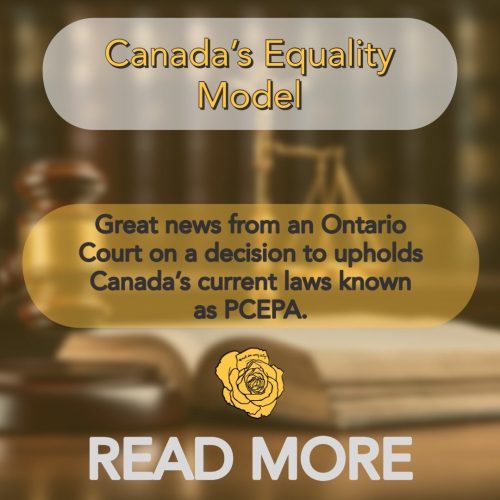
Statement from #NotInMyCity on the recent Ontario Supreme Court PCEPA Decision
At #NotInMyCity, our primary focus is protecting children and youth, through the prevention and disruption of sexual exploitation and human trafficking. The majority of girls and women who are in the commercial sex industry were sexually abused as children prior to recruitment1, which would suggest the establishment of a pattern of victimization.
It is our position that the Nordic or Equality model creates a balanced environment which we believe puts the safety of our communities first. Canada’s Protecting Communities and Exploited Persons Act (PCEPA) is based on this model.
#NotInMyCity supports the Ontario Supreme Court decision, released Monday September 18th, 2023, which has upheld a progressive legal provision known as the PCEPA dismissing the constitutional challenge brought forward by sex industry advocacy groups in 2021.
The system of prostitution is built on and perpetuates gender inequality. Canada’s existing equality model creates a system which rightfully infers that prostitution by its very nature is discriminatory against women. In our work as a Survivor-informed organization and through consultations with child sexual abuse and human trafficking survivors, we have learned that the Ontario Supreme Court’s upholding of the PCEPA has maintained a legal environment within Canada which is the safest existing model known and takes all viewpoints into account.
Many people don’t realize that selling sexual services in Canada is not illegal; here is the thinking behind this approach— People who find themselves in a place where they feel they have to sell sex should be offered every opportunity to exit that situation. The PCEPA approach targets purchasers of sexual services and third parties who develop economic interests in others’ sexual services, while providers of their own sexual services are not criminalized; rather, they are viewed as needing “support and assistance, not blame and punishment”.2 It is compassionate, and it keeps communities safe. This ruling upholds laws that fight sexual exploitation and reduce the demand for paid sex.
While it is clear from a legal perspective that prostitution and human trafficking are not one in the same, there is little relevant dissent that they are related. When the purchase of sexual services is fully legalized/decriminalized, human trafficking inflows are known to increase.3
We agree with Superior Court Justice Robert Goldstein’s decision and specifically his statement that, “there is a large amount of evidence that there are many involved in the sex trade – mostly men – who exploit and profit from the sexual labour of others – mostly women. That exploitation is not only parasitic and misogynistic; it is also frequently violent and manipulative.” It is our belief that this decision provides an opportunity for communities in Canada to stem demand for sexual services, and to support and improve gender equality.
As an organization focused on disrupting child sexual exploitation and human trafficking, it is our opinion that the PCEPA creates a necessary framework, which ultimately is the most protective for children and other marginalized and vulnerable individuals in Canada.